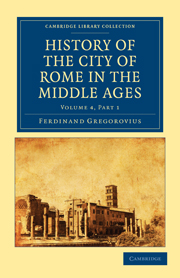CHAPTER III
Published online by Cambridge University Press: 05 October 2010
Summary
The great movement of the Church at this period conceals or dominates the history of the city. Long the stage and centre of the conflict between Church and State, it was only with difficulty that the city could attain and develop her own municipal independence. She sank into the service of the Pope or the Emperor and became divided into papal and imperial factions.
Beginning of Hildebrand's activity
After the extinction of the house of Otto the Roman nobles had made the Papacy subject to themselves, and for a time had tumultuously upheld the patriciate, the civic power of which, however, devoid as it was of lasting form, declined whenever the empire or the Papacy made any vigorous movement. Henry III., who destroyed the tyranny of the Tusculans, had with the patriciate obtained the right of the papal election for Germany, and through his German popes had infused new life into the Church. Scarcely was the Church reinvigorated by the aid of Germany, when she demanded from her saviour the right of election and finally entire freedom. Hildebrand was now not only the greatest man in Rome, but also one of the greatest politicians of all nations and all time. As leader of the great reform movement, he soon made everyone his instrument, the saints and monks, whose fanatical zeal he inflamed, the popes to whom he gave a policy, the Patarines of Lombardy, whom, like a demagogue, he sent into the field against the aristocracy and the recalcitrant bishops, the enthusiastic Margravines of Tuscany, whose friendship he acquired, and the rapacious Normans, in whom the Roman Church gained vassals and defenders.
- Type
- Chapter
- Information
- History of the City of Rome in the Middle Ages , pp. 92 - 131Publisher: Cambridge University PressPrint publication year: 2010First published in: 1896

